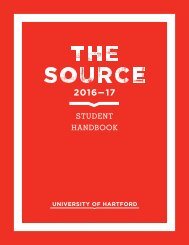advising
Create successful ePaper yourself
Turn your PDF publications into a flip-book with our unique Google optimized e-Paper software.
COLLEGE OF EDUCATION, NURSING AND HEALTH PROFESSIONS<br />
Advising Information: 860.768.4692<br />
M 119 Mathematics for Elementary School II [3]<br />
A study of measurement, geometry, probability, data analysis<br />
and algebra with emphasis on representations, problem solving,<br />
reasoning, communication, and connections. Note: This course is<br />
restricted to students in the early childhood, elementary, and<br />
special education programs. Prerequisite(s): M 118. Laboratory fee.<br />
M 140 Precalculus with Trigonometry [4]<br />
A study of linear and quadratic equations and inequalities; the<br />
Cartesian coordinate system for the plane; and the algebra and<br />
graphing of functions, with special emphasis on polynomial,<br />
exponential, and logarithmic functions. Definitions and graphs of the<br />
trigonometric functions; solutions of triangles; analytic trigonometry,<br />
including circular and inverse trigonometric functions. Solutions of<br />
word problems are stressed throughout. A programmable graphing<br />
calculator is required. The goal is to prepare students for M 144.<br />
Prerequisite: Two years of algebra.<br />
M 144 Calculus I [4]<br />
Functions, limits, continuity, differentiation of algebraic and<br />
trigonometric functions, applications of derivatives; definite integrals;<br />
approximate integration; and applications of the definite integral.<br />
Modern Languages<br />
Students wishing to begin a modern language should select an<br />
introductory-level modern language course (for example,<br />
FR 110, GER 110, SPA 110, or ITA 110). One year of high school<br />
language typically equals one semester of college language. Students<br />
with two or three years of a particular language should select an<br />
intermediate level of that language (at the 210 level). During the first<br />
week of language classes, instructors will make sure that students are<br />
at the correct level.<br />
Physics<br />
PHY 103 Physics for Radiologic Technology [4]<br />
This is a one-semester course designed to meet the needs of students<br />
in the radiologic technology major. Basic principles of mechanics,<br />
radioactivity, electricity, and magnetism are covered, with an<br />
emphasis on application to the human body and the bases of medical<br />
imaging. Prerequisite: High school algebra. Laboratory fee.<br />
Politics<br />
POL 110 Power and Politics in America [3]<br />
This survey course provides the foundation for understanding<br />
American government as it exists at the beginning of the 21st<br />
century. It deals with the organic background and contemporary<br />
reality of our federal republic governed under a written constitution.<br />
The established structures of government—Congress, president,<br />
bureaucracy, and courts—are studied, together with the less formal<br />
political structures, such as public opinion, parties, pressure groups,<br />
media, and voting—all of which grant our government the authority<br />
to act. The policies emerging from the systematic interplay of forces<br />
from within the government itself, from the states and the people<br />
of the nation, and from other nations of the world are studied and<br />
evaluated. This course fulfills a general education requirement.<br />
Premedical Studies<br />
PPS 100 Premedical Professions Studies I [1]<br />
Students study the health-care team and the role of various<br />
professions in health and disease. This problem-oriented course<br />
allows students to develop a working understanding of the education<br />
requirements and work environment for premedical professions.<br />
Pre—Physical Therapy<br />
PRPT 100 Pre-PT Seminar I [0.5]<br />
This course is designed to introduce first-year pre-physical therapy<br />
students to the profession of physical therapy and to guide them<br />
during their Bachelor’s in Health Science coursework. Students<br />
will explore the history of the profession, specialty areas of clinical<br />
practice and a broad overview of professional behaviors and how<br />
they impact practice and education. This course will emphasize the<br />
development of written and oral communication skills. Participation<br />
in the Physical Therapy Student Association is expected as well as<br />
attendance at ENHP Day. Prerequisite(s): Health sciences/physical<br />
therapy major (combined B.S./D.P.T. program).<br />
Psychology<br />
PSY 105 Introductory Psychology [3]<br />
This course discusses what factors have shaped who you are today.<br />
How does the brain work? What is the nature of prejudice? We<br />
will discuss these and other core questions related to the concepts,<br />
theories and methods of psychology. Topics include history;<br />
methodology; biological bases of behavior; development; sensation<br />
and perception; consciousness; cognition, social, and personality<br />
psychology and psychological disorders. (Please note PSY 105<br />
requires that students participate as a subject in at least one<br />
experiment in the department subject pool during the semester or<br />
discuss with the course instructor an appropriate alternative.)<br />
PSY 132/EDP 132 Human Development [3]<br />
Theories and research in human development from infancy through<br />
adulthood. Students carry out structured observations and integrate<br />
these observations with various theoretical issues. (Please note that<br />
this course will not fulfill a requirement for the psychology major<br />
or minor.)<br />
PSY 240 Infant and Child Development [3]<br />
Child growth and behavior from the prenatal period to puberty are<br />
studied. Effects of heredity and environment on the motor, language,<br />
social, and emotional development of children. Emphasis on the<br />
concept of developing self and its effects on behavior. Prerequisite:<br />
PSY 105.<br />
Sociology<br />
SOC 110 Introduction to Sociology [3]<br />
Surveys main theoretical approaches and problems in the study<br />
of social life. Topics include social origins of the self, the basic<br />
processes of social interaction, class and stratification, political<br />
power, education, organization, and family. Emphasizes continuing<br />
interaction between theory and methods in sociology. Required for<br />
sociology majors and most advanced sociology courses.<br />
31



